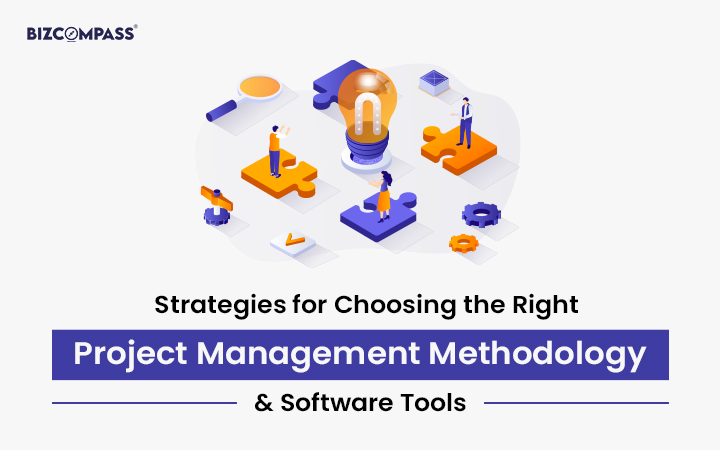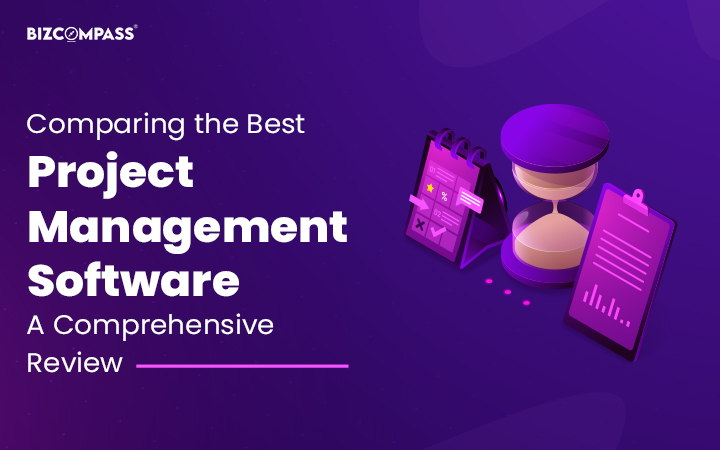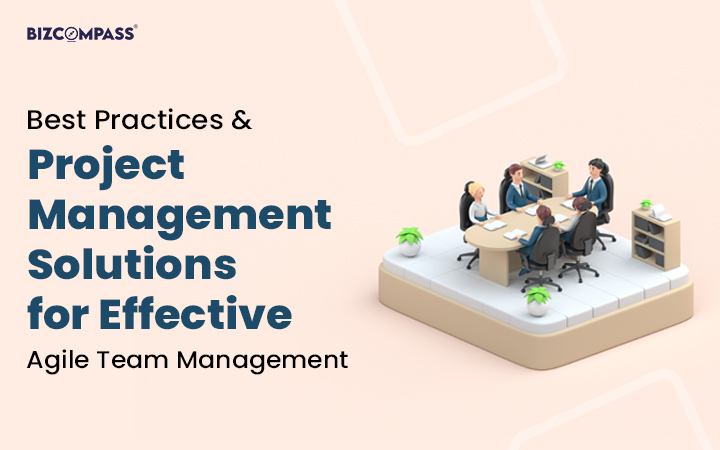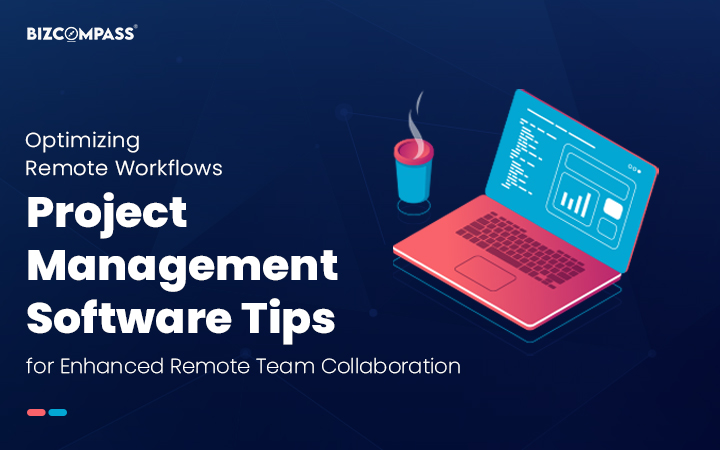Content
- Introduction
- Importance Of Selecting The Right Project Management Methodology
- Overview Of Top Project Management Methodologies
- Factors To Consider When Choosing A Project Management Methodology
- Comparing Project Management Methodologies
- Introduction To Project Management Software
- Importance Of Project Management Software In Methodology Implementation
- Key Features To Look For In Project Management Software
- Types Of Project Management Software
- Factors To Consider When Choosing Project Management Software
- Implementation Strategies For Project Management Software
- Best Practices For Using Project Management Software Effectively
- Future Trends In Project Management Methodologies And Software Development
- Final Thoughts
- Faq
Introduction
Project management methodologies are systematic approaches to planning, executing, monitoring, and controlling projects. These methodologies provide frameworks and guidelines for project managers and teams to achieve project goals efficiently and effectively.
From traditional to agile methodologies, each offers unique principles, processes, and practices tailored to different project types and requirements. Conventional methods, such as Waterfall, follow a linear sequential approach. Projects progress through distinct phases: initiation, planning, execution, monitoring, and closure. Requirements are defined upfront, and changes are typically costly to implement once the project is underway.
Agile methodologies, including Scrum and Kanban, prioritize flexibility and adaptability. Projects are divided into iterations or sprints, allowing for frequent iterations of planning, execution, and review. Agile methodologies embrace change and encourage collaboration between cross-functional teams, enhancing responsiveness to customer needs and market dynamics.
Hybrid methodologies combine elements of traditional and agile approaches to suit specific project requirements. Organizations can adopt hybrid methods to leverage the structured planning of traditional methodologies while incorporating the flexibility of agile practices. This allows for greater customization and optimization of project workflows.
Importance Of Selecting The Right Project Management Methodology
Choosing the appropriate project management methodology is crucial for success and organizational performance. The importance of selecting the right methodology is as follows.
01 Alignment With Project Characteristics
Different projects possess unique characteristics, such as scope, complexity, and stakeholder requirements. Selecting a methodology that aligns with these characteristics ensures a better fit between project needs and management approaches, enhancing project outcomes.
02 Optimized Resource Utilization
The correct methodology enables efficient allocation and utilization of resources, including time, budget, and personnel. Organizations can maximise productivity and minimise resource wastage by aligning project tasks with team capabilities and capacity.
03 Risk Management
Effective project management methodologies facilitate proactive risk identification, assessment, and mitigation. By integrating risk management processes into project workflows, organizations can anticipate potential challenges and implement timely interventions to minimize delays.
04 Stakeholder Engagement
Project management methodologies play a crucial role in fostering stakeholder engagement and collaboration. Clear communication channels, regular progress updates, and stakeholder involvement enhance transparency, trust, and satisfaction throughout the project lifecycle.
05 Continuous Improvement
Selecting the proper methodology enables organizations to embrace a culture of continuous improvement. Organizations can enhance project delivery capabilities and drive long-term success by evaluating project performance, identifying lessons learned, and refining processes.
The selection of the appropriate project management methodology is a critical decision that impacts project outcomes, organizational performance, and stakeholder satisfaction.
Overview Of Top Project Management Methodologies
Project management methodologies provide structured frameworks and guidelines for managing projects efficiently. Here's an overview of some commonly used methodologies.
01 Waterfall
Waterfall is a traditional, linear approach to project management. It follows a sequential process with distinct phases: initiation, planning, execution, monitoring, and closure.
Requirements are defined upfront, and each phase must be completed before proceeding to the next. While Waterfall provides clear milestones and documentation, it needs more flexibility to accommodate changes once the project is underway.
02 Agile
Agile methodologies prioritize adaptability and collaboration. Agile teams work in short iterations or sprints, delivering incremental value to stakeholders.
Agile emphasizes customer feedback, continuous improvement, and flexibility to respond to changing requirements. Popular Agile frameworks include Scrum, Kanban, and Lean.
03 Scrum
Scrum is an Agile framework that organizes work into fixed-length iterations called sprints. Scrum teams have defined roles, including a Product Owner, Scrum Master, and Development Team. Daily stand-up meetings, sprint planning, sprint review, and retrospective sessions are integral to Scrum, promoting transparency, accountability, and collaboration.
04 Kanban
Kanban is a visual Agile framework focusing on optimising workflow and continuous delivery. Work items are represented as cards on a Kanban board, visualising workflow through various stages. Kanban emphasizes limiting work in progress, balancing demand with capacity, and identifying bottlenecks to improve efficiency and throughput.
05 Lean
Lean principles originated from manufacturing but have been adapted for project management. Lean focuses on maximizing value while minimizing waste.
Fundamental principles include identifying and eliminating non-value-adding activities, empowering teams to make decisions, and optimizing processes for efficiency and flow.
06 Hybrid Methodologies
Hybrid methodologies combine elements of traditional and Agile approaches to tailor project management practices to specific needs.
Organizations can adopt hybrid methodologies to leverage the structured planning of traditional methods while incorporating the flexibility and adaptability of Agile practices.
From traditional Waterfall to Agile frameworks like Scrum and Kanban, each methodology has its strengths and weaknesses. Organizations can select the most appropriate approach to optimize outcomes by understanding the characteristics and principles of different methods.
Factors To Consider When Choosing A Project Management Methodology
Selecting the proper project management methodology is a critical decision that can significantly impact project success. Several factors should be considered to ensure alignment between the chosen methodology and project requirements.
01 Project Scope And Requirements
The complexity, size, and nature of the project influence the choice of methodology. Projects with defined, stable requirements benefit from traditional methods like Waterfall, while those with evolving requirements are better suited for Agile approaches like Scrum or Kanban.
02 Team Size And Composition
The size and composition of the project team play a crucial role in selecting the appropriate methodology. Agile methodologies are well-suited for small, cross-functional teams that value collaboration and adaptability, whereas larger teams require more structured approaches like Waterfall or hybrid methods.
03 Organizational Culture And Structure
The organizational culture and structure influence how projects are managed and executed. Organizations that prefer hierarchical structures and formal processes gravitate towards traditional methodologies, while those with a more flexible and innovative culture must embrace Agile practices.
04 Time Constraints And Deadlines
The project timeline and deadlines are essential considerations when choosing a methodology. Agile methodologies facilitate iterative delivery and allow frequent feedback, making them suitable for projects with tight deadlines or evolving priorities. Traditional methods are more appropriate for projects with fixed timelines and well-defined milestones.
05 Customer Involvement And Feedback
The level of customer involvement and feedback required throughout the project lifecycle can influence the choice of methodology. Agile methodologies emphasize customer collaboration and iterative development, enabling organizations to respond quickly to changing customer needs and preferences. Traditional methods are less conducive to frequent customer involvement but offer more predictability regarding deliverables and timelines.
Comparing Project Management Methodologies
01 Waterfall Vs. Agile
Approach: Waterfall follows a sequential, linear approach with distinct phases (initiation, planning, execution, monitoring, and closure). Agile, on the other hand, emphasizes flexibility, collaboration, and iterative development.
Flexibility: Waterfall is less flexible and struggles to house changes once the project is underway, whereas Agile welcomes change and adapts to evolving requirements.
Customer Involvement: Waterfall typically involves less customer involvement until the final stages, while Agile promotes frequent customer collaboration and feedback throughout the project lifecycle.
Risk Management:Â Waterfall identifies risks early but struggles to address them effectively later in the project. Agile continuously monitors and mitigates risks through iterative cycles, enhancing responsiveness and adaptability.
02 Agile Vs. Scrum
Framework: Agile is a broader approach encompassing various frameworks, including Scrum. Scrum is a specific Agile framework that organizes work into fixed-length iterations or sprints.
Roles And Events: Scrum defines specific roles (Product Owner, Scrum Master, Development Team) and events (sprint planning, daily stand-ups, sprint review, retrospective) to facilitate collaboration and transparency.
Iteration Length: Agile methodologies can have variable iteration lengths, while Scrum typically has fixed-length iterations (sprints) ranging from one to four weeks.
Emphasis:Â Agile emphasizes adaptability and customer collaboration across various frameworks, while Scrum places emphasis on roles, events, and sprint-based delivery.
03 Agile Vs. Kanban
Work Management: Agile focuses on iterative development and fixed-length iterations, whereas Kanban emphasizes visualizing workflow, limiting work in progress (WIP), and optimizing flow.
Planning: Agile methodologies involve upfront planning for each iteration or sprint, while Kanban allows for continuous planning and delivery based on priority.
Iterations: Agile methodologies have predefined iterations or sprints, while Kanban operates on a continuous flow basis with no predefined timeboxes.
Flexibility:Â Agile frameworks like Scrum provide more structure and guidelines, while Kanban offers greater flexibility and adaptability to workflow changes.
04 Scrum Vs. Kanban
Iterations: Scrum organizes work into fixed-length iterations (sprints), while Kanban operates on a continuous flow basis with no predefined timeboxes.
Roles: Scrum defines specific roles (Product Owner, Scrum Master, Development Team), whereas Kanban does not prescribe particular roles.
Workflow Visualization: Kanban emphasizes visualizing workflow stages on a Kanban board, whereas Scrum focuses on sprint-based planning and execution.
Work In Progress Limits: Kanban typically imposes WIP limits to optimize flow and minimize bottlenecks, while Scrum does not have explicit WIP limits but encourages teams to focus on completing work within the sprint.
Each project management methodology offers unique advantages and considerations. Understanding the differences between Waterfall, Agile, Scrum, and Kanban enables organizations to select the most suitable approach based on project requirements, team dynamics, and organizational goals.
Introduction To Project Management Software
Project management software is a centralized platform for planning, organizing, and executing projects. It offers tools and features to streamline project workflows, facilitate team members' collaboration, and track real-time progress.
From task management and scheduling to resource allocation and reporting, project management software enhances efficiency, transparency, and accountability throughout the project lifecycle. With customizable dashboards, Gantt charts, and communication tools, teams can effectively manage tasks, communicate updates, and monitor project milestones.
Project management software caters to diverse methodologies, allowing organizations to adopt agile, traditional, or hybrid approaches seamlessly.
Project management software is vital in optimizing project delivery, enhancing team productivity, and achieving project success.
Importance Of Project Management Software In Methodology Implementation
Project management software plays a crucial role in the successful implementation of project management methodologies by providing essential tools and features tailored to specific methodologies. Here's why it's important.
01 Methodology Alignment
Project management software can be customized to align with different methodologies: Waterfall, Agile, Scrum, or Kanban. It provides templates, workflows, and tools specific to each method, ensuring that teams adhere to the prescribed processes and practices.
02 Process Automation
Software automates repetitive tasks, such as scheduling, task assignment, and progress tracking, saving time and reducing manual errors. This automation ensures that teams can focus more on executing project tasks than on administrative overhead.
03 Collaboration And Communication
Project management software facilitates seamless collaboration and communication among team members, stakeholders, and clients. Features like real-time messaging, file sharing, and comment threads promote transparency, foster teamwork, and enable quick decision-making, essential components of Agile methodologies.
04 Visibility And Transparency
The software allows stakeholders real-time visibility into project progress, resource utilization, and potential bottlenecks by centralising project information and providing customizable dashboards and reports. This transparency is critical for monitoring performance, identifying issues early, and making data-driven decisions, regardless of the chosen methodology.
In essence, project management software catalyzes methodology implementation by providing the necessary infrastructure, automation, collaboration, and visibility to effectively support project teams in adhering to their chosen approach.
Key Features To Look For In Project Management Software
When selecting project management software, it's essential to consider key features that align with your team's needs and project requirements.
01 Task Management
Look for software that allows you to create, assign, and track tasks efficiently. Features like task dependencies, subtasks, and task prioritization can help streamline workflows.
02 Collaboration Tools
Choose software with robust collaboration features like real-time messaging, file sharing, and comment threads. These tools facilitate communication among team members, stakeholders, and clients, fostering collaboration and enhancing productivity.
03 Scheduling And Planning
Ensure the software offers tools for creating and managing project schedules, timelines, and milestones. Gantt charts, calendar views, and resource allocation features help plan and schedule effectively.
04 Resource Management
Look for software that enables you to allocate and manage resources effectively. Features like resource calendars, workload tracking, and resource utilization reports help optimize resource allocation and avoid overallocation.
05 Reporting And Analytics
Choose software that provides comprehensive reporting and analytics capabilities. Customizable dashboards, project health metrics, and performance reports enable you to monitor project progress, identify trends, and make data-driven decisions.
06 Integration And Compatibility
Consider software that integrates seamlessly with your team's tools and systems, such as email, document management, and issue-tracking software. Integration ensures smooth data flow and enhances productivity.
07 Customization And Scalability
Look for software with customization options to adapt to your team's unique workflows and methodologies. Additionally, scalability is essential to accommodate growing project requirements and team sizes.
By prioritizing these key features, you can select project management software that meets your team's needs, enhances collaboration, and supports successful project delivery.
Types Of Project Management Software
01 Traditional Project Management Tools
These tools are designed for linear project management methodologies like Waterfall. They typically feature Gantt charts for timeline visualization, resource allocation, budget tracking, and comprehensive reporting.
02 Agile Project Management Tools
Agile tools are tailored for iterative and collaborative methodologies such as Scrum and Kanban. They offer features like sprint planning, user story management, burndown charts, and collaborative boards for enhanced teamwork and adaptability.
03 Hybrid Project Management Tools
Hybrid tools bridge the gap between traditional and Agile methodologies, providing customizable workflows, integration capabilities, and iterative planning features. They cater to organizations that blend both approaches or transition between them based on project needs.
Factors To Consider When Choosing Project Management Software
01 Team Size And Collaboration Needs
Consider the size of your team and their collaboration requirements. Larger teams may require robust collaboration features such as real-time communication, task assignment, and document sharing, while smaller teams prioritize simplicity and ease of use.
02 Budget Constraints
Evaluate the cost of the software and ensure it aligns with your budget. Some tools offer free versions with limited features, while others require a subscription or one-time payment—factor in any additional costs for upgrades, add-ons, or support services.
03 Integration Capabilities With Other Tools
Assess whether the software integrates seamlessly with other tools and platforms your team uses, such as email, calendars, file storage, or project management apps.
Integration capabilities can streamline workflows and enhance productivity by eliminating the need for manual data entry and facilitating data exchange between systems.
04 Scalability
Consider the scalability of the software to accommodate future growth and changing needs. Choose a solution that can scale with your organization and support increasing project complexity, team size, and collaboration requirements over time.
05 Ease Of Use And Learning Curve
Evaluate the user interface and ease of use of the software. A user-friendly interface and intuitive navigation can reduce the learning curve for team members and encourage adoption.Â
Look for features like customizable dashboards, drag-and-drop functionality, and built-in tutorials or training resources to facilitate onboarding and usage.
Implementation Strategies For Project Management Software
01 Define Objectives And Requirements
Clearly define the objectives you aim to achieve with the project management software. Identify key requirements based on your team's needs, project scope, collaboration preferences, and organizational goals.
02 Select The Right Software
Conduct thorough research and evaluation to select the most suitable project management software for your organization. Consider factors such as features, scalability, ease of use, integration capabilities, and pricing.
03 Create An Implementation Plan
Develop a detailed implementation plan outlining the steps, timeline, and responsibilities for deploying the software. Include tasks such as data migration, software configuration, user training, and rollout strategy.
04 Customization And Configuration
Customize the software to align with your organization's processes and workflows. Configure project templates, task lists, workflows, and permissions to reflect your team's requirements and preferences.
05 Data Migration
If migrating from existing systems or tools, carefully plan and execute the data migration process. Ensure data integrity and consistency by mapping data fields accurately and conducting thorough testing before final migration.
06 User Training And Adoption
Provide comprehensive training to users on how to use the software effectively. Offer hands-on workshops, video tutorials, documentation, and ongoing support to help users navigate the software and adopt new workflows.
07 Pilot Testing
Conduct pilot testing with a small group of users to gather feedback, identify any issues or challenges, and refine processes before full deployment. Use pilot feedback to make necessary adjustments and improvements to the software implementation.
08 Rollout StrategyÂ
Develop a phased rollout strategy to introduce the software to different teams or departments gradually. Start with smaller projects or teams to build momentum and confidence, then expand usage gradually across the organization.
09 Continuous Improvement
Encourage feedback from users throughout the implementation process and beyond. Continuously monitor usage, performance, and user satisfaction to identify areas for improvement and optimize the software's effectiveness over time.
Best Practices For Using Project Management Software Effectively
01 Define Clear Processes And Workflows
Establish transparent project management processes and workflows that align with your team's goals and objectives. Define roles, responsibilities, and communication channels to ensure everyone understands their tasks and expectations.
02 Centralize Project Information
Use the project management software as a centralized repository for all project-related information, including tasks, documents, communication, and deadlines. This ensures team members can easily access the latest updates and resources.
03 Set Realistic Goals And Milestones:
Set realistic goals and milestones for your projects, breaking them into smaller, manageable tasks. Use the software's task management features to assign tasks, set deadlines, and track progress toward the goal.
04 Encourage Collaboration And Communication
Foster collaboration and communication among team members using the software's collaboration tools, such as commenting, @mentions, and file sharing. Encourage open communication and provide regular updates to inform everyone of project progress.
05 Regularly Update And Review Tasks
Regularly update task statuses, priorities, and deadlines to reflect the latest project developments. Conduct regular task reviews and status meetings to ensure everyone is on track and promptly address any issues or roadblocks.
06 Utilize Reporting And Analytics
Take advantage of the software's reporting and analytics features to gain insights into project performance, resource utilization, and progress toward goals. Use these insights to make data-driven decisions and identify areas for improvement.
07 Integrate With Other Tools
Integrate the project management software with your team's other tools and platforms, such as calendars, email, and document management systems. This streamlines workflows reduces duplicate data entry and enhances productivity.
08 Provide Ongoing Training And Support
Provide ongoing training and support to team members to ensure they can effectively use the software. Offer training sessions, documentation, and online resources to help users navigate the software's features and functionalities.
09 Regularly Evaluate And Improve Processes
Continuously evaluate your project management processes and workflows to identify areas for improvement. Solicit feedback from team members and stakeholders and adjust as needed to optimize efficiency and effectiveness.
Future Trends In Project Management Methodologies And Software Development
01 Greater Emphasis On Hybrid Methodologies
Future trends are likely to see a rise in hybrid project management methodologies that combine the strengths of traditional and Agile approaches.
Organizations will seek flexible frameworks that allow them to adapt to changing project requirements while maintaining a level of structure and control.
02 AI And Automation Integration
Artificial Intelligence (AI) and automation will significantly affect project management software development. AI-powered tools will streamline repetitive tasks, optimize resource allocation, and provide predictive analytics to improve decision-making and project outcomes.
03 Focus On Remote Collaboration
With the increasing prevalence of remote work, project management software will evolve to better support remote collaboration and virtual teamwork.
Enhanced communication features, virtual whiteboards, and real-time collaboration tools will become standard to facilitate seamless remote project management.
04 Blockchain For Project Tracking And Transparency
Blockchain technology may be integrated into project management software to enhance transparency, traceability, and security.
Blockchain can provide immutable project data records, including transactions, contracts, and changes, ensuring greater accountability and trust among stakeholders.
05 Agile At Scale
Agile methodologies will continue evolving to support more significant, complex projects and organizations. Scaling Agile practices across multiple teams and departments will require enhanced coordination, communication, and alignment to maintain agility.
06 DevOps Integration
Project management methodologies will increasingly integrate with DevOps practices to streamline software development processes and accelerate delivery.
DevOps principles such as continuous integration, delivery, and automated testing will be incorporated into project management workflows to improve efficiency and collaboration.
07 Focus On Sustainability And Social Responsibility
Project management methodologies and software will incorporate considerations for sustainability and social responsibility. Organizations will prioritize projects that contribute to environmental sustainability, community well-being, and ethical practices, with project management tools offering features to track and report on these metrics.
The need for flexibility, efficiency, collaboration, and sustainability will drive future trends in project management methodologies and software development.
Final Thoughts
As project management methodologies and software evolve, embracing flexibility, innovation, and collaboration will be essential for success.
Organizations can drive efficiency, productivity, and value in their project management endeavours by staying informed about emerging trends, adapting to changing project dynamics and leveraging advanced tools and practices. Prioritizing continuous improvement, learning, and adaptation will empower teams to navigate modern project management's complexities and effectively achieve their goals in a rapidly changing landscape.
Lastly, if you are looking for project management software, check out Bizcompass. It is the ideal platform for all types of tasks and conversations. Conduct business efficiently.


 >
>






